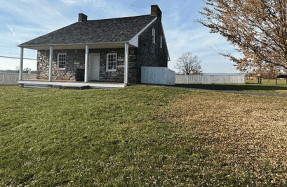THE UNSHAKABLE GEN. DODGE

In describing Union Maj. Gen. Grenville Mellen Dodge to Ulysses S. Grant, his commander and friend, William Sherman usually kept it simple. “Dodge is a brick,” he once wrote Grant—perhaps the perfect compliment for a luminary who never quite made it into the Civil War Pantheon and continues to escape notice even today. Although Dodge fought in only two major battles—Pea Ridge in 1862 and Atlanta in 1864—his contributions to ultimate Union victory should not be underestimated. In Grant’s opinion, Dodge was both the best railroad-builder and best railroad-destroyer the war would see in either Army. He was, however, remarkable in many other ways.
Slight of built, weighing only 130 pounds, Dodge surely didn’t look like a brick. What did single him out was his incredible optimism, his indomitable will, and his love of action. A Massachusetts native and 1851 graduate of Vermont’s Norwich University—with a degree in civil engineering—he eventually relocated to Council Bluffs, Iowa, where he had an opportune meeting with Abraham Lincoln while Lincoln was stumping for the Republican Party’s 1860 presidential nomination. He shared Lincoln’s vision for a transcontinental railroad and would use his influence at the 1860 Republican Convention to win Iowa for Lincoln.
After Fort Sumter in April 1861, Dodge dissolved his business interests and, at Governor Samuel J. Kirkwood’s behest, traveled to Washington, D.C., to obtain arms for Iowa volunteer regiments. There, he was offered colonelcy of the 4th Iowa Infantry. “I go into this war on principle, [which] pecuniarily will ruin me,” Dodge wrote his mother. “I put my trust in God; if I come out safe, I hope no one will have cause to regret my course.”
As senior officer at Fort Wyman in Rolla, Mo., Dodge was known to drill his men relentlessly, even before they had their weapons, uniforms, or equipment. While in Maj. Gen. John C. Frémont’s Western Department, Dodge created what he later called his “secret service.” Frustrated his cavalry often embarked on fruitless scouting excursions in response to enemy sightings, Dodge learned that the men in one independent Missouri cavalry unit were locals and were willing, if paid, to serve as his scouts in the region. It was a welcome proposal, and Dodge worked with his provost marshal to use funds that were collected through fines and related methods to support the spies’ endeavors. “I followed it throughout my service,” Dodge later wrote, “and found it of great benefit.”
On a visit to St. Louis in October 1861,
You’re reading a preview, subscribe to read more.
Start your free 30 days

